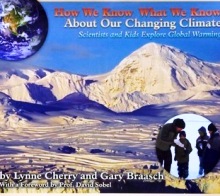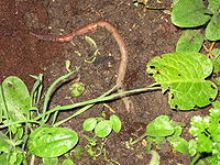| |
|
 |
Catholic Eco Schools Newsletter No.7
December 12, 2008 :
 |
 |
 |
A new book written by Lynne Cherry and Gary Braasch helps teachers and children understand the complex issues of climate change. |
A very warm and festive welcome to our seventh newsletter, which includes:
A. A reminder about Operation Noah Campaign.
B. What can a Million Kids Do?
C. A message about Earthworms.
D. An article about Advent and The Twelve C’s of Christmas.
E. An update of the CIDSE Catholic Bishops’ call for Climate Justice.
F. Not Catholic – but an inspiring example from a school in Scotland, using pedal-power to light up its Christmas tree. Includes links to a BBC video story.
A. A reminder about Operation Noah Campaign.
For discussions about celebrating Christmas in a traditional and reflective manner (“prophets not profits”) Operation Noah’s Campaign this year urging Christians to "Reclaim Christmas” may offer some guidance. Link
here to read more about the campaign which was launched on 11 November by Father Christopher Jamison. And here
for his talk, starting with a delightful anecdote about a fancy dress party he once attended. The website includes a specially commissioned play, which might inspire an assembly or an end of term classroom activity. Take a look too at our fourth story in this newsletter.
B. What Can A Million Kids do?
How We Know What We Know About Our Changing Climate: Scientists and Kids Explore Global Warming, by Lynne Cherry and Gary Braasch, is an American book that looks at the science of climate and how kids can learn by becoming citizen scientists. It was written for middle schoolers and their teachers, with clear explanations of what scientists do, what the words mean, how children can observe nature like scientists, and how some kids are using their knowledge to reduce their carbon footprint. Although some of the examples are very US-orientated, the book is full of great project ideas about tracking the flight of Monarch butterflies, taking river water samples, etc which can be adapted for UK pupils, as well as some ideas and facts and figures about what a million kids can do, which might be interesting as a basis for an environmental, empowering classroom discussion.
The book was featured in an interview on BBC America, 18 November 2008, and the website – complete with sample pages and teaching materials - is
here.
Classroom materials are
here.
And sample pages are
here
C. A message about Earthworms.
 |
 |
 |
An earthworm survey in March 2009 will be part of an initiative to encourage the public to engage with their local environment.Photo from http://en.wikipedia.org/wiki/. |
They might not be as pretty as North American Monarch butterflies, but we’ve just heard about a new project to survey the earthworms of Britain. OPAL has been awarded a grant from the Big Lottery Fund and runs until December 2012. It is developing participative programmes to encourage people from all backgrounds to explore, study and learn about their local environments, while generating valuable scientific data through nation-wide wildlife surveys.
The first survey is on soil and earthworms and will be launched in March 2009. The survey will take around 45 minutes and involves making observations and carrying out some basic chemical and physical tests on soil from test sites e.g. pH and texture. The activity will also involve an earthworm hunt where participants will follow a key to identify the earthworms that they find. The survey is aimed at anyone from age 11 upwards; however younger scientists can get involved with adult supervision. After the fieldwork activity participants can input their data onto the OPAL website and then view their data in relation to other local and regional tests. The data will be also analysed by scientists and outcomes will be used in the “State of the Environment” report to be published by Imperial College London at the end of the project.
It is very much in tune with St Francis’ request to his monks to observe nature, both large and small.
For more details look on the OPAL website. We will be doing our own earthworm survey at the ARC offices near Bath, and will be letting you know more in March about what we discover.
D. Advent and The Twelve C’s of Christmas
(adapted from a list compiled by Mark Dowd at Operation Noah)
What other Cs of Christmas can your pupils think of?
1. Children: Christmas is about young life, and hope for the future.
2. Consumption: the engine of economic growth which enslaves us and treats creation as a mere commodity there for our use.
3. Community: a true focus outside of our selves and immediate families directing us to be mindful of those in need around us.
4. Commercialism: that which sees the price of everything and the value of nothing and sees, in Christmas, one sole opportunity: profits (and not prophets).
5. Carols: with their joyous references to the humility of the Christ-child story.
6. Carbon: the by-product of so much of our modern over-consuming lifestyle.
7. Creation: God’s marvellous work, of which we are a small, but key part. God works ex nihilo, creating out of nothing. Even before the advent of humans in the Genesis creation narrative, God looks on at each passing day’s work and declares all that he sees as “good”.
8. Climate Change: our great unchartered experiment with the biosphere. Threats to creation loom large if we don’t awaken ourselves to the call to go back to some basic principles and live more simply, more sustainably.
9. Celebration: this is the time to be joyful, hopeful and full of fun. And if there isn’t something to celebrate about the environment, then why bother?
10. Chaos: the disordered world that could await us if we do not live accordingly within the limits of God’s precepts.
11. Candles: four for each of the weeks of Advent, signifying the coming light that will shine in the darkness and which “darkness cannot overpower.” (St John’s Gospel Ch1).
12. Christ: on whom all our waiting is centred. In the simplicity and modesty of his birth, we find God’s word among us with a clear message: “Live Simply.”
E. The Cooperation for International Development and Solidarity (CIDSE) Catholic Bishops have called for Climate Justice to coincide with the UN Climate Change Conference in Poznan, Poland.
CIDSE Catholic Bishops from developed and developing countries made a call for Climate Justice to coincide with the recent UN Climate Change Summit. The Summit which is running from 1-12 December in Poznan, Poland is the precursor to Conference of Parties (COP) in Copenhagen, Denmark in December 2009. The 2009 COP meeting will be the last opportunity for parties of the UNFCCC to meet at Government-level prior to the Kyoto Protocol expiry in 2012. Link here for full details of the statement and for more details of the recent UN Climate Change Summit, link
here. What should Catholic schools be saying, in time for Copenhagen, and how can their voices best be heard?
F. And finally, a village primary school in southwest Scotland is taking part in a pilot project to use recycled exercise bikes and an inverter, to create up to 150 hours of electricity – enough to power their Christmas lights. The BBC has covered the story, and the web-page includes a video. Perhaps its story might inspire Catholic schools to follow suit. here
May we take this opportunity at ARC to wish you all a very Happy and Peaceful Christmas!
Do let us know any stories, ideas, experiences or questions you would like to contribute and share in the New Year, and we’ll make sure we distribute them.
ARC
Links
Link here to read more Catholic Schools Eco Newsletters.
Link here to download ARC's leaflet focussing on Catholic Schools and the environment.
Link here for The Sound of Many Waters environmental initiative by Clifton Cathedral.
Other LinksLink to the Catholic Earthcare website.
Link here for a BBC news story about The Sound of Many Waters.
Link to the BBC's "World on the Move".
Link here for an edited version of: THE CALL OF CREATION: GOD'S INVITATION AND THE HUMAN RESPONSE which was first published in 2002 by the Catholic Bishops' Conference of England and Wales, adding its voice to the many calling for urgent action to protect our earthly home from further destruction.
|
 |
 |
|
|
|
|
|
 |
Last updated: September 24, 2009 :
Latest news on the Long Term Commitments
A sample of some of the faith groups around the world that are creating Five, Seven, Eight and Nine Year Plans to protect the natural environment, through the UNDP-ARC framework. |
 |
April 1, 2009:
Putting Catholic faith into action on climate change
The Catholic Coalition on Climate Change is launching a unique and unprecedented initiative to demonstrate a common Catholic commitment to care for God’s creation. |
 |
 |
|
|

